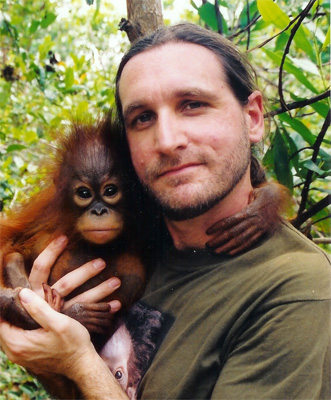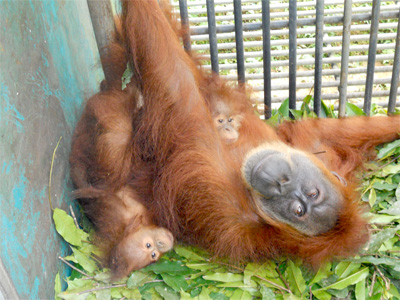Leif Cocks Sumatran Orangutan Twins Interview

Leif Cocks Sumatran Orangutan Twins Interview
As a species in great peril due to habitat loss and poaching, two beautiful Sumatran orangutan twins have celebrated their first birthday and become a beacon of hope for orangutan survival. The twins Ganteng (male), and Ginting (female) were born in January 2011 to parents, Gober and Leuser in a Sumatran Orangutan rescue centre. The twins' birthday marks a giant milestone as both parents are blind and were given the chance to breed to improve their quality of life.Although twins are not unheard of amongst orangutans, they are not common and few zoos around the world have the pleasure of experiencing them. Ganteng and Ginting were born at the Batu Mbelin orangutan quarantine centre in North Sumartra (run by the Sumatran Orangutan Conservation Programme (SOCP) and funded by The Orangutan Project), Indonesia and remain there today.
Since entering the world, Ganteng and Ginting have successfully managed to grow into healthy and happy little orangutans without the need of interference from SOCP staff. As the twins have grown, they have begun to explore their surroundings by climbing the bars and investigating their cage. Ginting has become the adventurous and daring of the two, while Ganteng prefers the close proximity of mum.
Prior to the birth of their beautiful twins both Gober and Leuser had experienced many hardships, like nearly all orangutans that end up in rescue centres in Sumatra and Borneo. Gober is an elderly female, well over 40 years old, who is blind in both eyes due to cataracts.
She was captured by SOCP vets in November 2008, in a place known locally as Sampan Getek, Langkat, where around 15 orangutans survive in an area of mixed rubber and palm oil plantations that is completely isolated from the forests. As Gober is blind she was unable to easily find food for herself and routinely raided villager's crops. If she had not been captured, local farmers would have eventually killed Gober. The twins' father, Leuser, was originally confiscated as an illegal pet in Aceh Tenggara in February 2004.
At that time he was fit and well and was therefore quickly released into the wild in Bukit Tigapuluh National Park, Jambi province, in 2004. There he lived happily as a wild orangutan, until late 2006, when he was found near a village approximately 40km from the National Park boundaries, having been shot by local villagers 62 times with an air rifle. Three of the rifle pellets lodged in his eyes, 2 in the left and 1 in the right, and he is now totally blind as a result. 16 of the pellets have also been removed from his body, but 46 are still in there. It would be impossible to take them all out without jeopardizing his life, and these will remain in his body until he dies. 3 local villagers were jailed for shooting Leuser, all receiving sentences in excess of 3 months, and Leuser was returned to the quarantine centre in November 2006 for long term care.
As a blind orangutan, having the opportunity to breed has extensively improved the quality of life for mum Gober. She now has the fortune of looking after her two beautiful bubs instead of being confined to boredom. Gober has the full responsibility of caring for and nurturing her infants, and her natural motherly instincts have ensured that she is a good mother that takes care of her children extremely well.
Often, Gober helps the twins get to her nipple for milk whenever they start looking to nurse. As male orangutans do not play a role in taking care of infants, the father Leuser is currently being kept separate from Ganteng and Gingting. However, as the twins grow and become strong enough they will be introduced to their father when the time is right.
For a small sum of just $110 annually, families and individuals can foster the twins and help them to continue to grow and possibly return to the wild in the future, adding to the rapidly diminishing Sumatran Orangutan gene pool.
With the help of their mother and our many loyal AOP supporters, the twins are now thriving and successfully coming into their own individual beings. They are now happy, healthy and beautiful one-yearold orangutans. You can help Ganteng and Gingting move towards their second birthday as happy and healthy orangutans by fostering them at www. orangutan.org.au/adoptions-new/adoption-thetwins-yearly

Interview with Leif Cocks
Question: What hope do twins Ganteng and Ginting provide for the future of the Sumantran Orangutans?Leif Cocks: They will be released into Bukit Tigapuluh, where The Orangutan Project (TOP) operates it paramilitary Wildlife Protection Units, so their individual prospects are very good.
Question: How common are twin orangutans?
Leif Cocks: The same as humans, about 2%.
Question: What are some of the threats associated with the survival of Sumantran Orangutans?
Leif Cocks: Firstly, the conversion of their habitat to agriculture, mostly palm oil and pulp paper plantations, then the killing of orangutans as an agricultural pest, mainly by palm oil plantations, then lastly killing of mothers for orphans for the illegal pet trade.
Question: Is there enough being done, in regards to the threat the Palm Oil industry poses on Orangutans?
Leif Cocks: No, regulations and enforcement is lacking. Short-term profits by the greedy few outweigh sustainable economics, protection of environmental services, humans rights and wildlife conservation.
Question: What are some of the challenges facing the Sumatran Orangutan Conservation Programme?
Leif Cocks: Raising enough funds for TOP programs to be able to counteract the greed by a few that is destroying the orangutan's habitat.
Question: How does adoption help the future of orangutans? What do the funds go towards?
Leif Cocks: It provides TOP with the finds to care for and reintroduce orphans and most importantly funds to protect natural habitat for both their reintroduction and to prevent further orangutans becoming orphans.
Question: How common are cataracts in Orangutans?
Leif Cocks: Cataracts is very rare however increases when the orangutan's habitat is destroyed and they try to survive is degraded forest with excessive light.
Question: What is the expected life span of the twin orangutans?
Leif Cocks: We hope they will live well into their sixties.
Question: What further work do we need to fund to ensure the long-term survival of the Sumantran Orangutan?
Leif Cocks: Eighty percent of orangutans live outside of protected areas in degraded forest. We need to stop the destruction of their habitat, change the land's legal status to protected forest and provide effective on the ground law enforcement.
Question: What's one fact about Orangutans that most people don't know?
Leif Cocks: They are ecologically termed as 'starvation specialists' evolved to survive, as fruit eaters, in marginal and erratically fruiting rainforest.
Question: When and how did you first start working with Orangutans?
Leif Cocks: Twenty five years ago, when I become responsible for the care of the orangutans at Perth Zoo.
Interview by Brooke Hunter
MORE
- Clean Up Australia Day
- Brioche Installs Solar Air-Con
- Acting for a Sustainable Future
- Melbourne's Own Solar Powered Charging Station...
- Battery Hazard
- Q.CELLS Completes Europe's Largest Solar Project
- First Cyclone-Proof Solar Modules in Australia
- TEC's Waste Not
- Solar Charging Station for Electric Vehicles
- Globe recycling program





